Management Accounting Report: Modern Ltd. Analysis & Solutions
VerifiedAdded on 2020/12/29
|14
|3719
|417
Report
AI Summary
This report provides a comprehensive overview of management accounting principles, focusing on their application within Modern Ltd. It begins with an introduction to management accounting, its core concepts, and essential requirements, along with various techniques and methods used in reporting. The report then delves into the application of absorption and marginal costing methods to prepare income statements, showcasing their impact on financial reporting. Furthermore, it explores the advantages and disadvantages of different budgeting methods and their significance in financial planning and control. Finally, the report examines how management accounting systems can be utilized to address and overcome financial issues. The report includes detailed calculations, analyses, and comparisons to illustrate the practical implications of each concept. This comprehensive analysis provides valuable insights into effective financial management and decision-making within an organization.
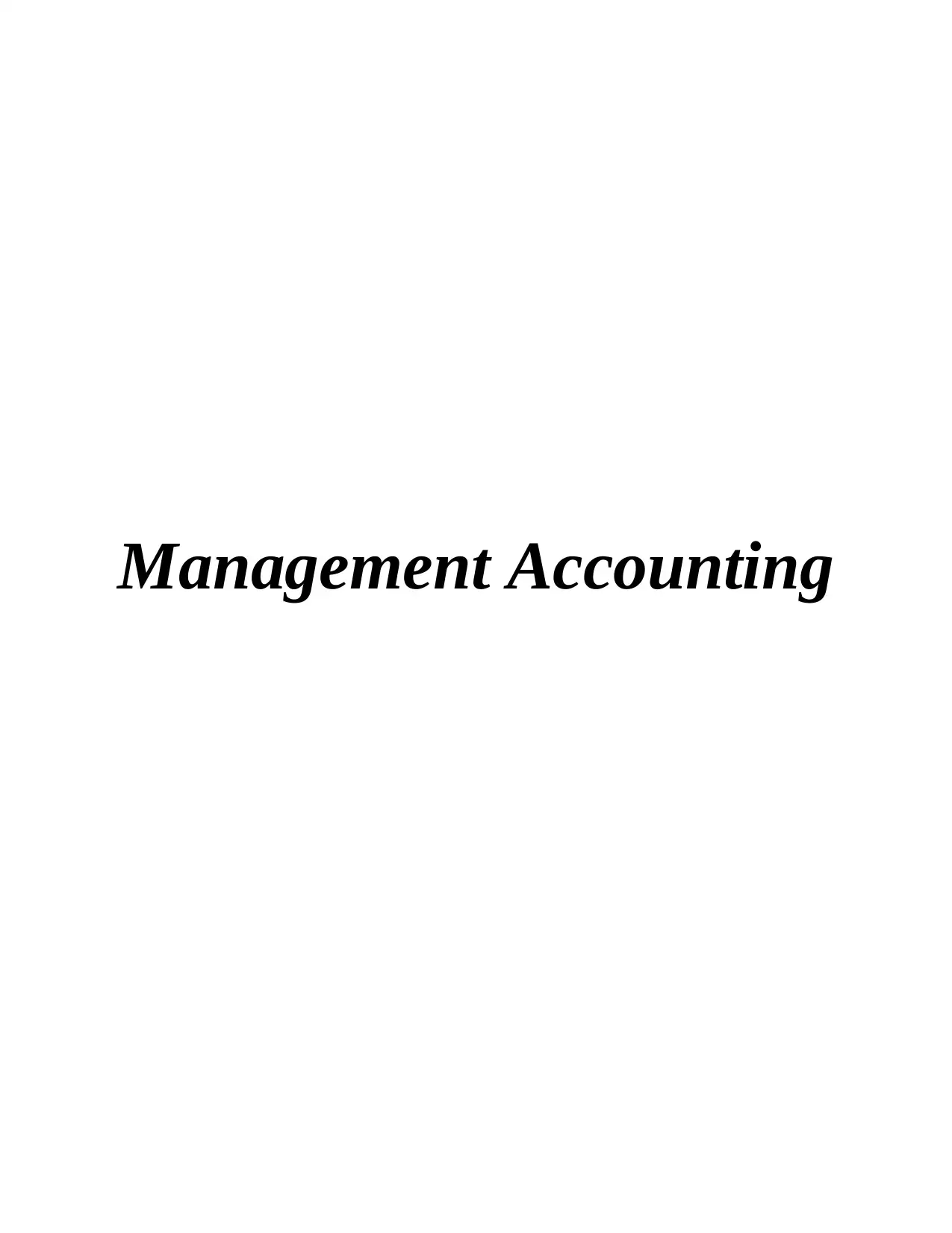
Management Accounting
Paraphrase This Document
Need a fresh take? Get an instant paraphrase of this document with our AI Paraphraser

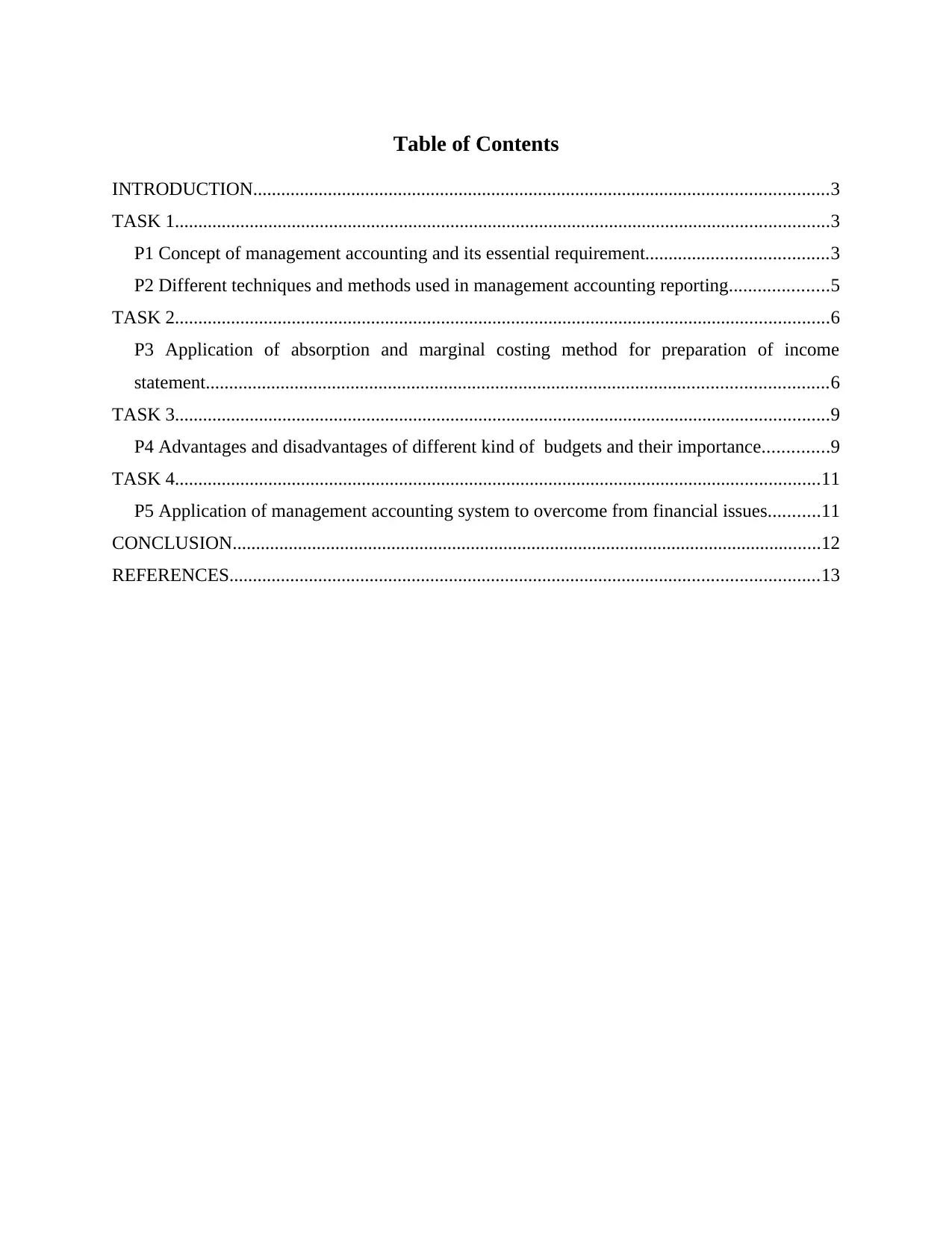
Table of Contents
INTRODUCTION...........................................................................................................................3
TASK 1............................................................................................................................................3
P1 Concept of management accounting and its essential requirement.......................................3
P2 Different techniques and methods used in management accounting reporting.....................5
TASK 2............................................................................................................................................6
P3 Application of absorption and marginal costing method for preparation of income
statement.....................................................................................................................................6
TASK 3............................................................................................................................................9
P4 Advantages and disadvantages of different kind of budgets and their importance..............9
TASK 4..........................................................................................................................................11
P5 Application of management accounting system to overcome from financial issues...........11
CONCLUSION..............................................................................................................................12
REFERENCES..............................................................................................................................13
INTRODUCTION...........................................................................................................................3
TASK 1............................................................................................................................................3
P1 Concept of management accounting and its essential requirement.......................................3
P2 Different techniques and methods used in management accounting reporting.....................5
TASK 2............................................................................................................................................6
P3 Application of absorption and marginal costing method for preparation of income
statement.....................................................................................................................................6
TASK 3............................................................................................................................................9
P4 Advantages and disadvantages of different kind of budgets and their importance..............9
TASK 4..........................................................................................................................................11
P5 Application of management accounting system to overcome from financial issues...........11
CONCLUSION..............................................................................................................................12
REFERENCES..............................................................................................................................13
⊘ This is a preview!⊘
Do you want full access?
Subscribe today to unlock all pages.

Trusted by 1+ million students worldwide
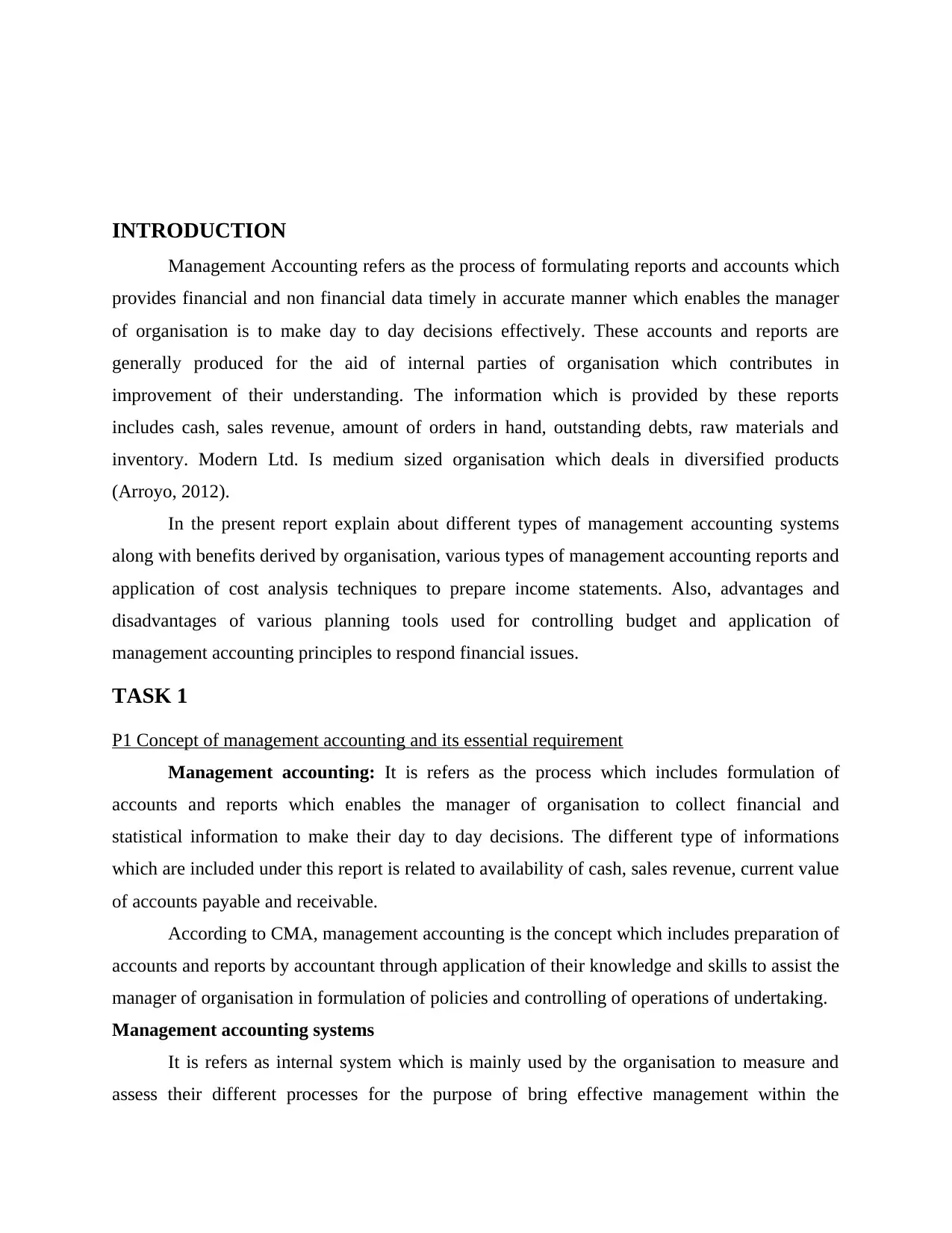
INTRODUCTION
Management Accounting refers as the process of formulating reports and accounts which
provides financial and non financial data timely in accurate manner which enables the manager
of organisation is to make day to day decisions effectively. These accounts and reports are
generally produced for the aid of internal parties of organisation which contributes in
improvement of their understanding. The information which is provided by these reports
includes cash, sales revenue, amount of orders in hand, outstanding debts, raw materials and
inventory. Modern Ltd. Is medium sized organisation which deals in diversified products
(Arroyo, 2012).
In the present report explain about different types of management accounting systems
along with benefits derived by organisation, various types of management accounting reports and
application of cost analysis techniques to prepare income statements. Also, advantages and
disadvantages of various planning tools used for controlling budget and application of
management accounting principles to respond financial issues.
TASK 1
P1 Concept of management accounting and its essential requirement
Management accounting: It is refers as the process which includes formulation of
accounts and reports which enables the manager of organisation to collect financial and
statistical information to make their day to day decisions. The different type of informations
which are included under this report is related to availability of cash, sales revenue, current value
of accounts payable and receivable.
According to CMA, management accounting is the concept which includes preparation of
accounts and reports by accountant through application of their knowledge and skills to assist the
manager of organisation in formulation of policies and controlling of operations of undertaking.
Management accounting systems
It is refers as internal system which is mainly used by the organisation to measure and
assess their different processes for the purpose of bring effective management within the
Management Accounting refers as the process of formulating reports and accounts which
provides financial and non financial data timely in accurate manner which enables the manager
of organisation is to make day to day decisions effectively. These accounts and reports are
generally produced for the aid of internal parties of organisation which contributes in
improvement of their understanding. The information which is provided by these reports
includes cash, sales revenue, amount of orders in hand, outstanding debts, raw materials and
inventory. Modern Ltd. Is medium sized organisation which deals in diversified products
(Arroyo, 2012).
In the present report explain about different types of management accounting systems
along with benefits derived by organisation, various types of management accounting reports and
application of cost analysis techniques to prepare income statements. Also, advantages and
disadvantages of various planning tools used for controlling budget and application of
management accounting principles to respond financial issues.
TASK 1
P1 Concept of management accounting and its essential requirement
Management accounting: It is refers as the process which includes formulation of
accounts and reports which enables the manager of organisation to collect financial and
statistical information to make their day to day decisions. The different type of informations
which are included under this report is related to availability of cash, sales revenue, current value
of accounts payable and receivable.
According to CMA, management accounting is the concept which includes preparation of
accounts and reports by accountant through application of their knowledge and skills to assist the
manager of organisation in formulation of policies and controlling of operations of undertaking.
Management accounting systems
It is refers as internal system which is mainly used by the organisation to measure and
assess their different processes for the purpose of bring effective management within the
Paraphrase This Document
Need a fresh take? Get an instant paraphrase of this document with our AI Paraphraser
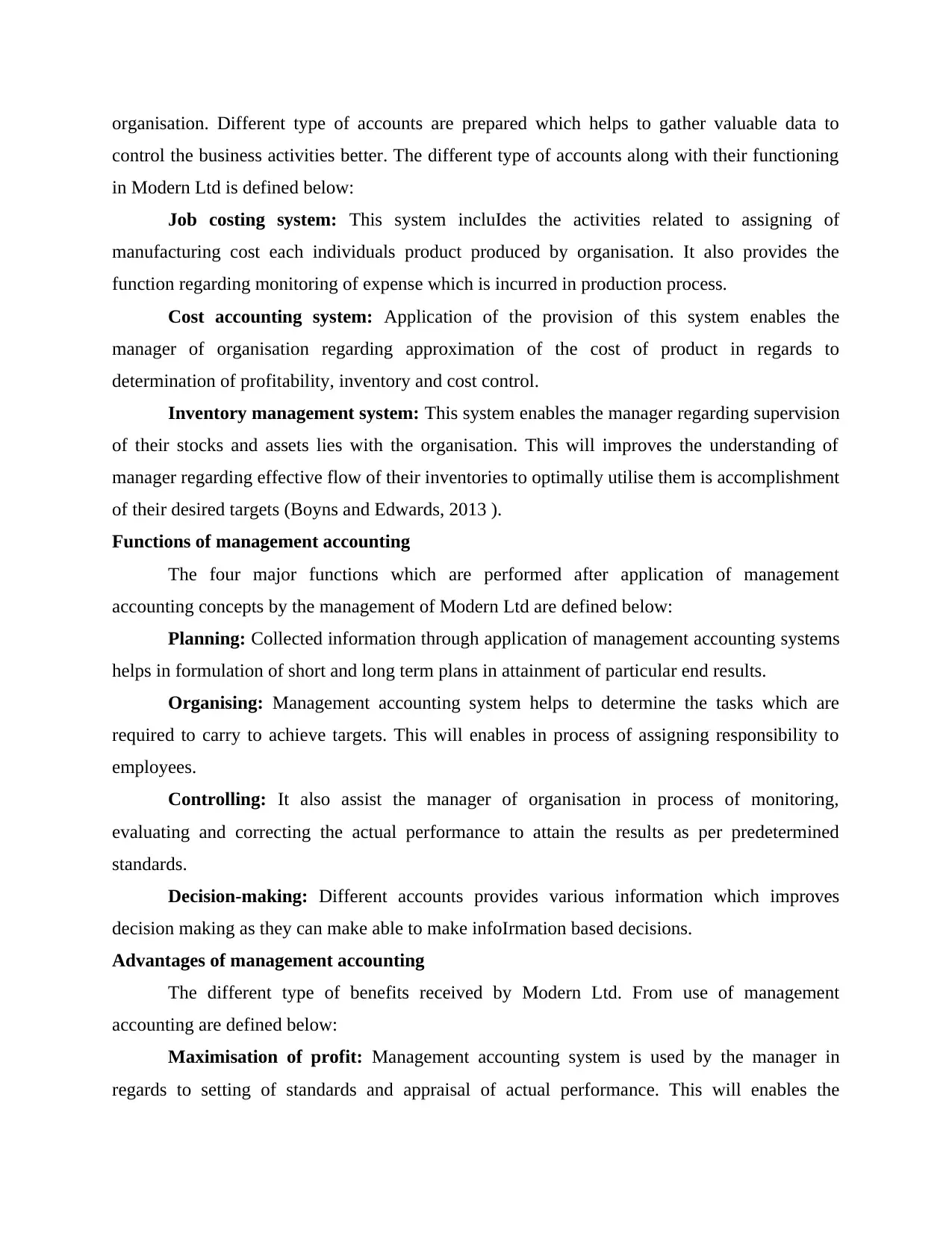
organisation. Different type of accounts are prepared which helps to gather valuable data to
control the business activities better. The different type of accounts along with their functioning
in Modern Ltd is defined below:
Job costing system: This system incluIdes the activities related to assigning of
manufacturing cost each individuals product produced by organisation. It also provides the
function regarding monitoring of expense which is incurred in production process.
Cost accounting system: Application of the provision of this system enables the
manager of organisation regarding approximation of the cost of product in regards to
determination of profitability, inventory and cost control.
Inventory management system: This system enables the manager regarding supervision
of their stocks and assets lies with the organisation. This will improves the understanding of
manager regarding effective flow of their inventories to optimally utilise them is accomplishment
of their desired targets (Boyns and Edwards, 2013 ).
Functions of management accounting
The four major functions which are performed after application of management
accounting concepts by the management of Modern Ltd are defined below:
Planning: Collected information through application of management accounting systems
helps in formulation of short and long term plans in attainment of particular end results.
Organising: Management accounting system helps to determine the tasks which are
required to carry to achieve targets. This will enables in process of assigning responsibility to
employees.
Controlling: It also assist the manager of organisation in process of monitoring,
evaluating and correcting the actual performance to attain the results as per predetermined
standards.
Decision-making: Different accounts provides various information which improves
decision making as they can make able to make infoIrmation based decisions.
Advantages of management accounting
The different type of benefits received by Modern Ltd. From use of management
accounting are defined below:
Maximisation of profit: Management accounting system is used by the manager in
regards to setting of standards and appraisal of actual performance. This will enables the
control the business activities better. The different type of accounts along with their functioning
in Modern Ltd is defined below:
Job costing system: This system incluIdes the activities related to assigning of
manufacturing cost each individuals product produced by organisation. It also provides the
function regarding monitoring of expense which is incurred in production process.
Cost accounting system: Application of the provision of this system enables the
manager of organisation regarding approximation of the cost of product in regards to
determination of profitability, inventory and cost control.
Inventory management system: This system enables the manager regarding supervision
of their stocks and assets lies with the organisation. This will improves the understanding of
manager regarding effective flow of their inventories to optimally utilise them is accomplishment
of their desired targets (Boyns and Edwards, 2013 ).
Functions of management accounting
The four major functions which are performed after application of management
accounting concepts by the management of Modern Ltd are defined below:
Planning: Collected information through application of management accounting systems
helps in formulation of short and long term plans in attainment of particular end results.
Organising: Management accounting system helps to determine the tasks which are
required to carry to achieve targets. This will enables in process of assigning responsibility to
employees.
Controlling: It also assist the manager of organisation in process of monitoring,
evaluating and correcting the actual performance to attain the results as per predetermined
standards.
Decision-making: Different accounts provides various information which improves
decision making as they can make able to make infoIrmation based decisions.
Advantages of management accounting
The different type of benefits received by Modern Ltd. From use of management
accounting are defined below:
Maximisation of profit: Management accounting system is used by the manager in
regards to setting of standards and appraisal of actual performance. This will enables the
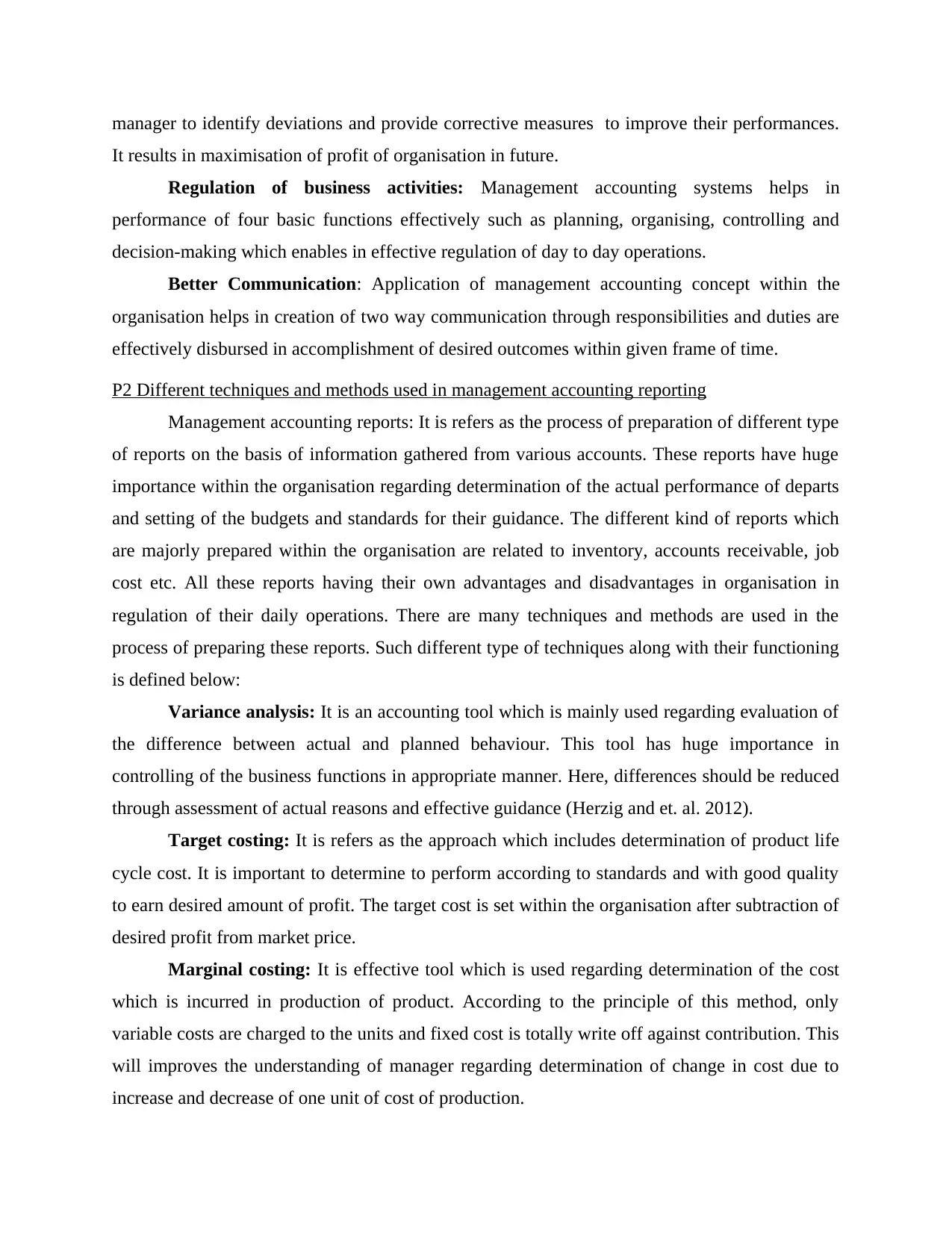
manager to identify deviations and provide corrective measures to improve their performances.
It results in maximisation of profit of organisation in future.
Regulation of business activities: Management accounting systems helps in
performance of four basic functions effectively such as planning, organising, controlling and
decision-making which enables in effective regulation of day to day operations.
Better Communication: Application of management accounting concept within the
organisation helps in creation of two way communication through responsibilities and duties are
effectively disbursed in accomplishment of desired outcomes within given frame of time.
P2 Different techniques and methods used in management accounting reporting
Management accounting reports: It is refers as the process of preparation of different type
of reports on the basis of information gathered from various accounts. These reports have huge
importance within the organisation regarding determination of the actual performance of departs
and setting of the budgets and standards for their guidance. The different kind of reports which
are majorly prepared within the organisation are related to inventory, accounts receivable, job
cost etc. All these reports having their own advantages and disadvantages in organisation in
regulation of their daily operations. There are many techniques and methods are used in the
process of preparing these reports. Such different type of techniques along with their functioning
is defined below:
Variance analysis: It is an accounting tool which is mainly used regarding evaluation of
the difference between actual and planned behaviour. This tool has huge importance in
controlling of the business functions in appropriate manner. Here, differences should be reduced
through assessment of actual reasons and effective guidance (Herzig and et. al. 2012).
Target costing: It is refers as the approach which includes determination of product life
cycle cost. It is important to determine to perform according to standards and with good quality
to earn desired amount of profit. The target cost is set within the organisation after subtraction of
desired profit from market price.
Marginal costing: It is effective tool which is used regarding determination of the cost
which is incurred in production of product. According to the principle of this method, only
variable costs are charged to the units and fixed cost is totally write off against contribution. This
will improves the understanding of manager regarding determination of change in cost due to
increase and decrease of one unit of cost of production.
It results in maximisation of profit of organisation in future.
Regulation of business activities: Management accounting systems helps in
performance of four basic functions effectively such as planning, organising, controlling and
decision-making which enables in effective regulation of day to day operations.
Better Communication: Application of management accounting concept within the
organisation helps in creation of two way communication through responsibilities and duties are
effectively disbursed in accomplishment of desired outcomes within given frame of time.
P2 Different techniques and methods used in management accounting reporting
Management accounting reports: It is refers as the process of preparation of different type
of reports on the basis of information gathered from various accounts. These reports have huge
importance within the organisation regarding determination of the actual performance of departs
and setting of the budgets and standards for their guidance. The different kind of reports which
are majorly prepared within the organisation are related to inventory, accounts receivable, job
cost etc. All these reports having their own advantages and disadvantages in organisation in
regulation of their daily operations. There are many techniques and methods are used in the
process of preparing these reports. Such different type of techniques along with their functioning
is defined below:
Variance analysis: It is an accounting tool which is mainly used regarding evaluation of
the difference between actual and planned behaviour. This tool has huge importance in
controlling of the business functions in appropriate manner. Here, differences should be reduced
through assessment of actual reasons and effective guidance (Herzig and et. al. 2012).
Target costing: It is refers as the approach which includes determination of product life
cycle cost. It is important to determine to perform according to standards and with good quality
to earn desired amount of profit. The target cost is set within the organisation after subtraction of
desired profit from market price.
Marginal costing: It is effective tool which is used regarding determination of the cost
which is incurred in production of product. According to the principle of this method, only
variable costs are charged to the units and fixed cost is totally write off against contribution. This
will improves the understanding of manager regarding determination of change in cost due to
increase and decrease of one unit of cost of production.
⊘ This is a preview!⊘
Do you want full access?
Subscribe today to unlock all pages.

Trusted by 1+ million students worldwide
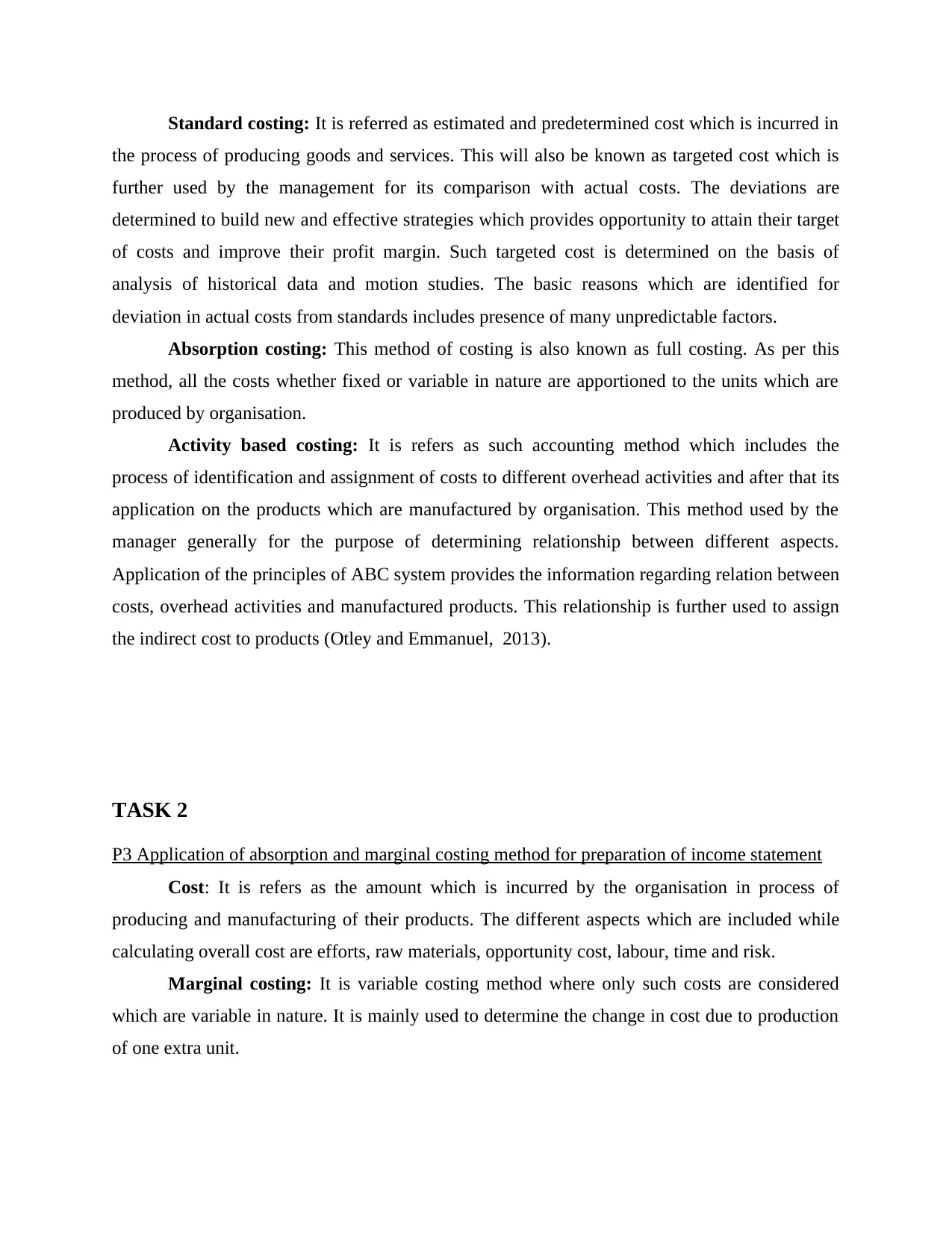
Standard costing: It is referred as estimated and predetermined cost which is incurred in
the process of producing goods and services. This will also be known as targeted cost which is
further used by the management for its comparison with actual costs. The deviations are
determined to build new and effective strategies which provides opportunity to attain their target
of costs and improve their profit margin. Such targeted cost is determined on the basis of
analysis of historical data and motion studies. The basic reasons which are identified for
deviation in actual costs from standards includes presence of many unpredictable factors.
Absorption costing: This method of costing is also known as full costing. As per this
method, all the costs whether fixed or variable in nature are apportioned to the units which are
produced by organisation.
Activity based costing: It is refers as such accounting method which includes the
process of identification and assignment of costs to different overhead activities and after that its
application on the products which are manufactured by organisation. This method used by the
manager generally for the purpose of determining relationship between different aspects.
Application of the principles of ABC system provides the information regarding relation between
costs, overhead activities and manufactured products. This relationship is further used to assign
the indirect cost to products (Otley and Emmanuel, 2013).
TASK 2
P3 Application of absorption and marginal costing method for preparation of income statement
Cost: It is refers as the amount which is incurred by the organisation in process of
producing and manufacturing of their products. The different aspects which are included while
calculating overall cost are efforts, raw materials, opportunity cost, labour, time and risk.
Marginal costing: It is variable costing method where only such costs are considered
which are variable in nature. It is mainly used to determine the change in cost due to production
of one extra unit.
the process of producing goods and services. This will also be known as targeted cost which is
further used by the management for its comparison with actual costs. The deviations are
determined to build new and effective strategies which provides opportunity to attain their target
of costs and improve their profit margin. Such targeted cost is determined on the basis of
analysis of historical data and motion studies. The basic reasons which are identified for
deviation in actual costs from standards includes presence of many unpredictable factors.
Absorption costing: This method of costing is also known as full costing. As per this
method, all the costs whether fixed or variable in nature are apportioned to the units which are
produced by organisation.
Activity based costing: It is refers as such accounting method which includes the
process of identification and assignment of costs to different overhead activities and after that its
application on the products which are manufactured by organisation. This method used by the
manager generally for the purpose of determining relationship between different aspects.
Application of the principles of ABC system provides the information regarding relation between
costs, overhead activities and manufactured products. This relationship is further used to assign
the indirect cost to products (Otley and Emmanuel, 2013).
TASK 2
P3 Application of absorption and marginal costing method for preparation of income statement
Cost: It is refers as the amount which is incurred by the organisation in process of
producing and manufacturing of their products. The different aspects which are included while
calculating overall cost are efforts, raw materials, opportunity cost, labour, time and risk.
Marginal costing: It is variable costing method where only such costs are considered
which are variable in nature. It is mainly used to determine the change in cost due to production
of one extra unit.
Paraphrase This Document
Need a fresh take? Get an instant paraphrase of this document with our AI Paraphraser
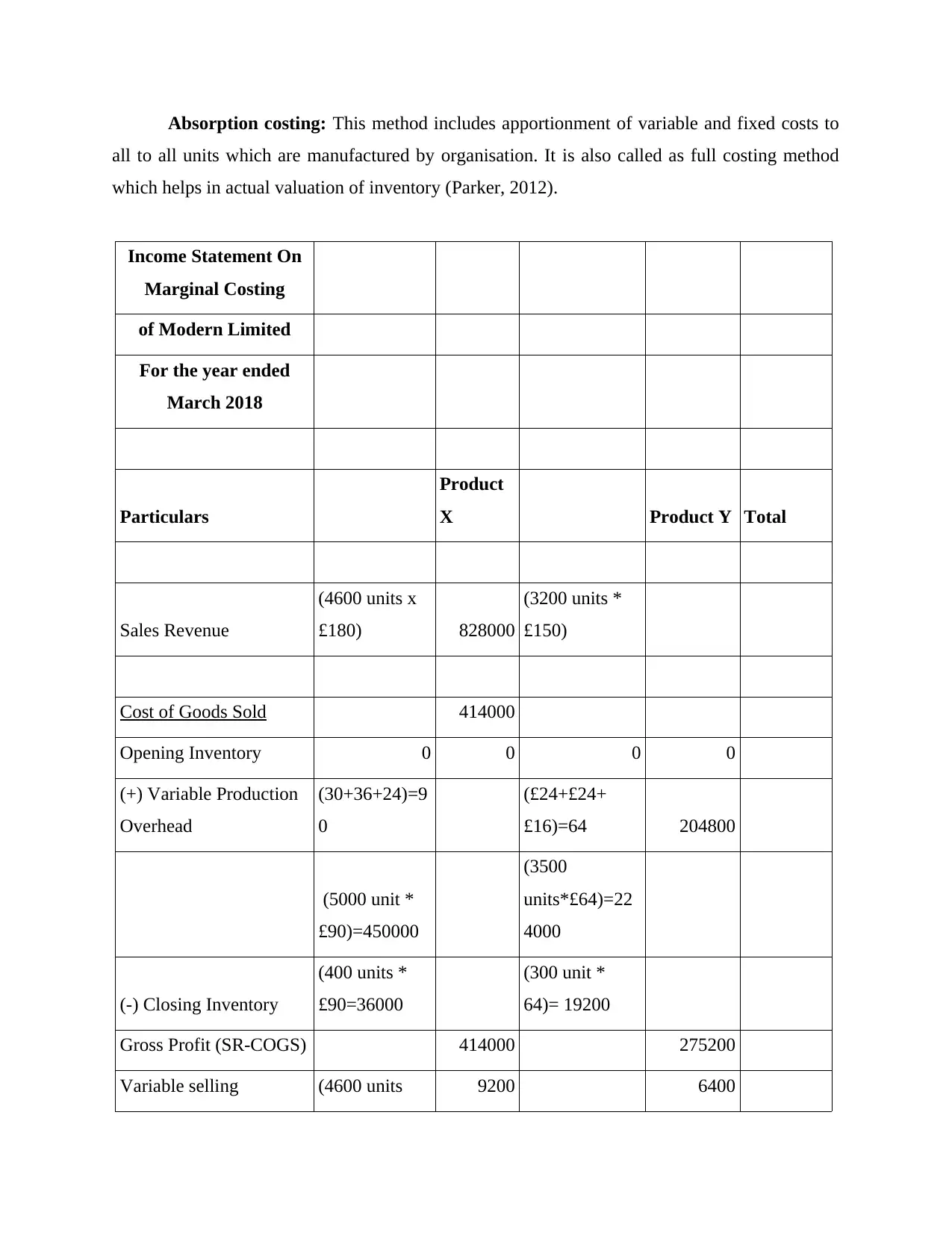
Absorption costing: This method includes apportionment of variable and fixed costs to
all to all units which are manufactured by organisation. It is also called as full costing method
which helps in actual valuation of inventory (Parker, 2012).
Income Statement On
Marginal Costing
of Modern Limited
For the year ended
March 2018
Particulars
Product
X Product Y Total
Sales Revenue
(4600 units x
£180) 828000
(3200 units *
£150)
Cost of Goods Sold 414000
Opening Inventory 0 0 0 0
(+) Variable Production
Overhead
(30+36+24)=9
0
(£24+£24+
£16)=64 204800
(5000 unit *
£90)=450000
(3500
units*£64)=22
4000
(-) Closing Inventory
(400 units *
£90=36000
(300 unit *
64)= 19200
Gross Profit (SR-COGS) 414000 275200
Variable selling (4600 units 9200 6400
all to all units which are manufactured by organisation. It is also called as full costing method
which helps in actual valuation of inventory (Parker, 2012).
Income Statement On
Marginal Costing
of Modern Limited
For the year ended
March 2018
Particulars
Product
X Product Y Total
Sales Revenue
(4600 units x
£180) 828000
(3200 units *
£150)
Cost of Goods Sold 414000
Opening Inventory 0 0 0 0
(+) Variable Production
Overhead
(30+36+24)=9
0
(£24+£24+
£16)=64 204800
(5000 unit *
£90)=450000
(3500
units*£64)=22
4000
(-) Closing Inventory
(400 units *
£90=36000
(300 unit *
64)= 19200
Gross Profit (SR-COGS) 414000 275200
Variable selling (4600 units 9200 6400
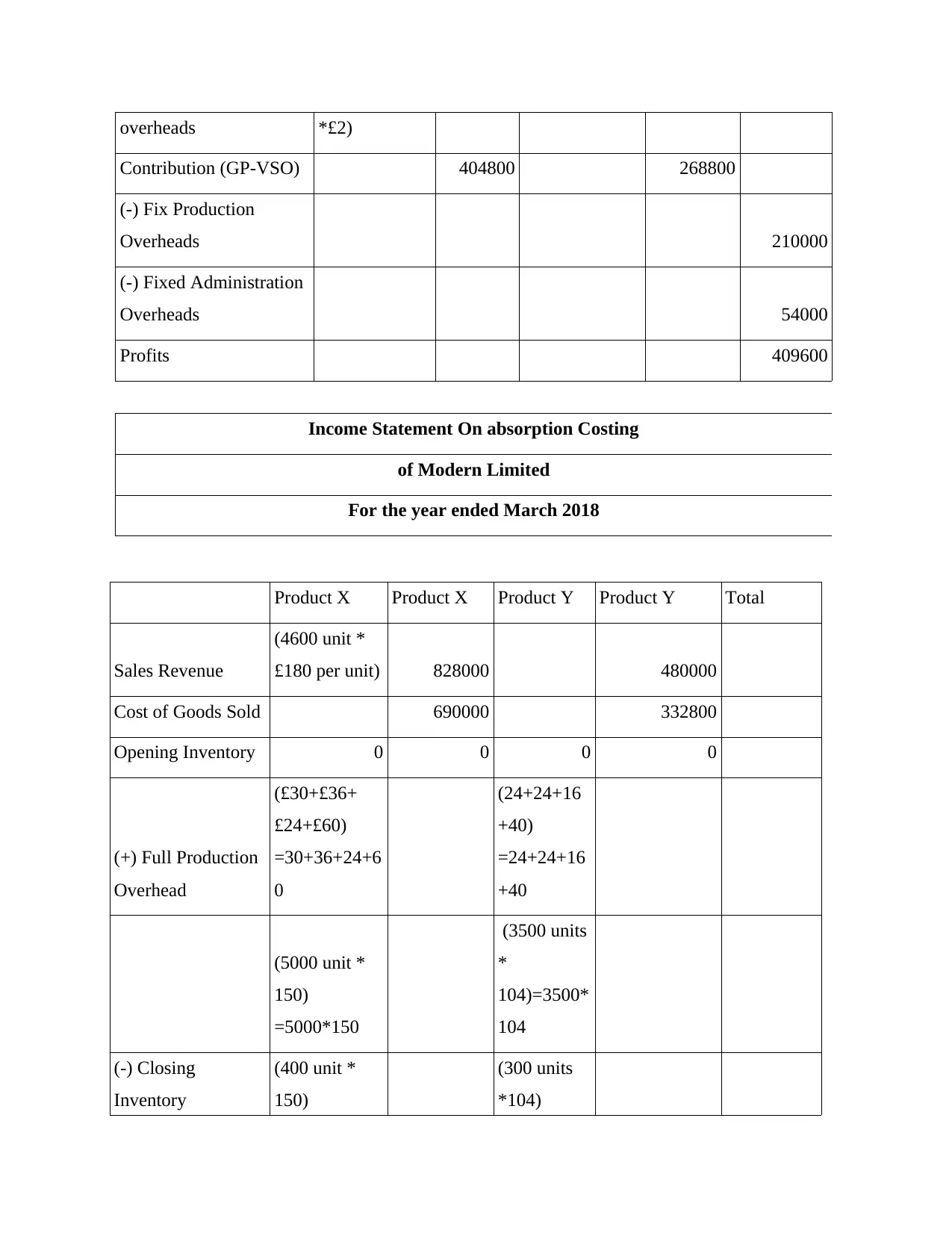
overheads *£2)
Contribution (GP-VSO) 404800 268800
(-) Fix Production
Overheads 210000
(-) Fixed Administration
Overheads 54000
Profits 409600
Income Statement On absorption Costing
of Modern Limited
For the year ended March 2018
Product X Product X Product Y Product Y Total
Sales Revenue
(4600 unit *
£180 per unit) 828000 480000
Cost of Goods Sold 690000 332800
Opening Inventory 0 0 0 0
(+) Full Production
Overhead
(£30+£36+
£24+£60)
=30+36+24+6
0
(24+24+16
+40)
=24+24+16
+40
(5000 unit *
150)
=5000*150
(3500 units
*
104)=3500*
104
(-) Closing
Inventory
(400 unit *
150)
(300 units
*104)
Contribution (GP-VSO) 404800 268800
(-) Fix Production
Overheads 210000
(-) Fixed Administration
Overheads 54000
Profits 409600
Income Statement On absorption Costing
of Modern Limited
For the year ended March 2018
Product X Product X Product Y Product Y Total
Sales Revenue
(4600 unit *
£180 per unit) 828000 480000
Cost of Goods Sold 690000 332800
Opening Inventory 0 0 0 0
(+) Full Production
Overhead
(£30+£36+
£24+£60)
=30+36+24+6
0
(24+24+16
+40)
=24+24+16
+40
(5000 unit *
150)
=5000*150
(3500 units
*
104)=3500*
104
(-) Closing
Inventory
(400 unit *
150)
(300 units
*104)
⊘ This is a preview!⊘
Do you want full access?
Subscribe today to unlock all pages.

Trusted by 1+ million students worldwide
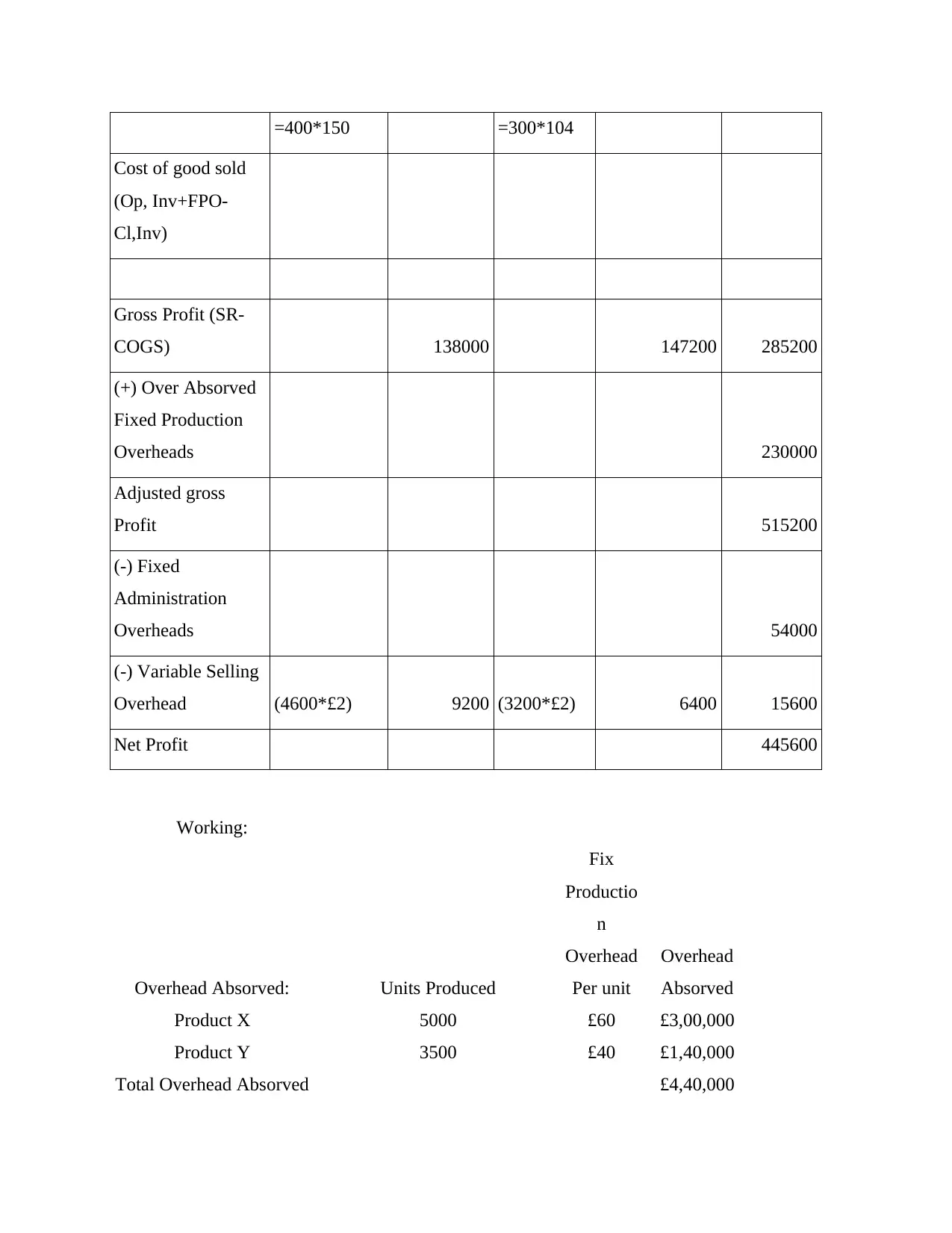
=400*150 =300*104
Cost of good sold
(Op, Inv+FPO-
Cl,Inv)
Gross Profit (SR-
COGS) 138000 147200 285200
(+) Over Absorved
Fixed Production
Overheads 230000
Adjusted gross
Profit 515200
(-) Fixed
Administration
Overheads 54000
(-) Variable Selling
Overhead (4600*£2) 9200 (3200*£2) 6400 15600
Net Profit 445600
Working:
Overhead Absorved: Units Produced
Fix
Productio
n
Overhead
Per unit
Overhead
Absorved
Product X 5000 £60 £3,00,000
Product Y 3500 £40 £1,40,000
Total Overhead Absorved £4,40,000
Cost of good sold
(Op, Inv+FPO-
Cl,Inv)
Gross Profit (SR-
COGS) 138000 147200 285200
(+) Over Absorved
Fixed Production
Overheads 230000
Adjusted gross
Profit 515200
(-) Fixed
Administration
Overheads 54000
(-) Variable Selling
Overhead (4600*£2) 9200 (3200*£2) 6400 15600
Net Profit 445600
Working:
Overhead Absorved: Units Produced
Fix
Productio
n
Overhead
Per unit
Overhead
Absorved
Product X 5000 £60 £3,00,000
Product Y 3500 £40 £1,40,000
Total Overhead Absorved £4,40,000
Paraphrase This Document
Need a fresh take? Get an instant paraphrase of this document with our AI Paraphraser
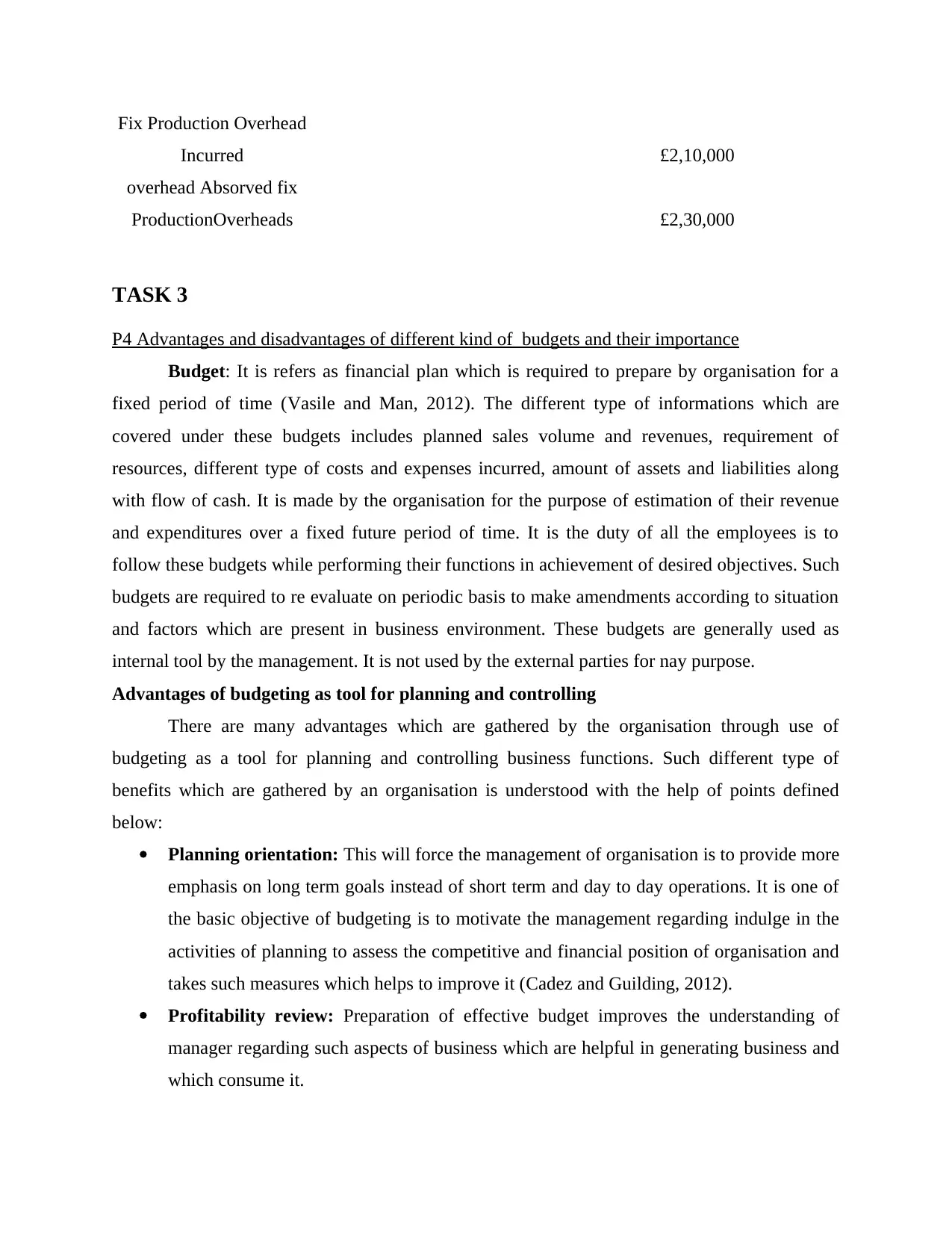
Fix Production Overhead
Incurred £2,10,000
overhead Absorved fix
ProductionOverheads £2,30,000
TASK 3
P4 Advantages and disadvantages of different kind of budgets and their importance
Budget: It is refers as financial plan which is required to prepare by organisation for a
fixed period of time (Vasile and Man, 2012). The different type of informations which are
covered under these budgets includes planned sales volume and revenues, requirement of
resources, different type of costs and expenses incurred, amount of assets and liabilities along
with flow of cash. It is made by the organisation for the purpose of estimation of their revenue
and expenditures over a fixed future period of time. It is the duty of all the employees is to
follow these budgets while performing their functions in achievement of desired objectives. Such
budgets are required to re evaluate on periodic basis to make amendments according to situation
and factors which are present in business environment. These budgets are generally used as
internal tool by the management. It is not used by the external parties for nay purpose.
Advantages of budgeting as tool for planning and controlling
There are many advantages which are gathered by the organisation through use of
budgeting as a tool for planning and controlling business functions. Such different type of
benefits which are gathered by an organisation is understood with the help of points defined
below:
Planning orientation: This will force the management of organisation is to provide more
emphasis on long term goals instead of short term and day to day operations. It is one of
the basic objective of budgeting is to motivate the management regarding indulge in the
activities of planning to assess the competitive and financial position of organisation and
takes such measures which helps to improve it (Cadez and Guilding, 2012).
Profitability review: Preparation of effective budget improves the understanding of
manager regarding such aspects of business which are helpful in generating business and
which consume it.
Incurred £2,10,000
overhead Absorved fix
ProductionOverheads £2,30,000
TASK 3
P4 Advantages and disadvantages of different kind of budgets and their importance
Budget: It is refers as financial plan which is required to prepare by organisation for a
fixed period of time (Vasile and Man, 2012). The different type of informations which are
covered under these budgets includes planned sales volume and revenues, requirement of
resources, different type of costs and expenses incurred, amount of assets and liabilities along
with flow of cash. It is made by the organisation for the purpose of estimation of their revenue
and expenditures over a fixed future period of time. It is the duty of all the employees is to
follow these budgets while performing their functions in achievement of desired objectives. Such
budgets are required to re evaluate on periodic basis to make amendments according to situation
and factors which are present in business environment. These budgets are generally used as
internal tool by the management. It is not used by the external parties for nay purpose.
Advantages of budgeting as tool for planning and controlling
There are many advantages which are gathered by the organisation through use of
budgeting as a tool for planning and controlling business functions. Such different type of
benefits which are gathered by an organisation is understood with the help of points defined
below:
Planning orientation: This will force the management of organisation is to provide more
emphasis on long term goals instead of short term and day to day operations. It is one of
the basic objective of budgeting is to motivate the management regarding indulge in the
activities of planning to assess the competitive and financial position of organisation and
takes such measures which helps to improve it (Cadez and Guilding, 2012).
Profitability review: Preparation of effective budget improves the understanding of
manager regarding such aspects of business which are helpful in generating business and
which consume it.
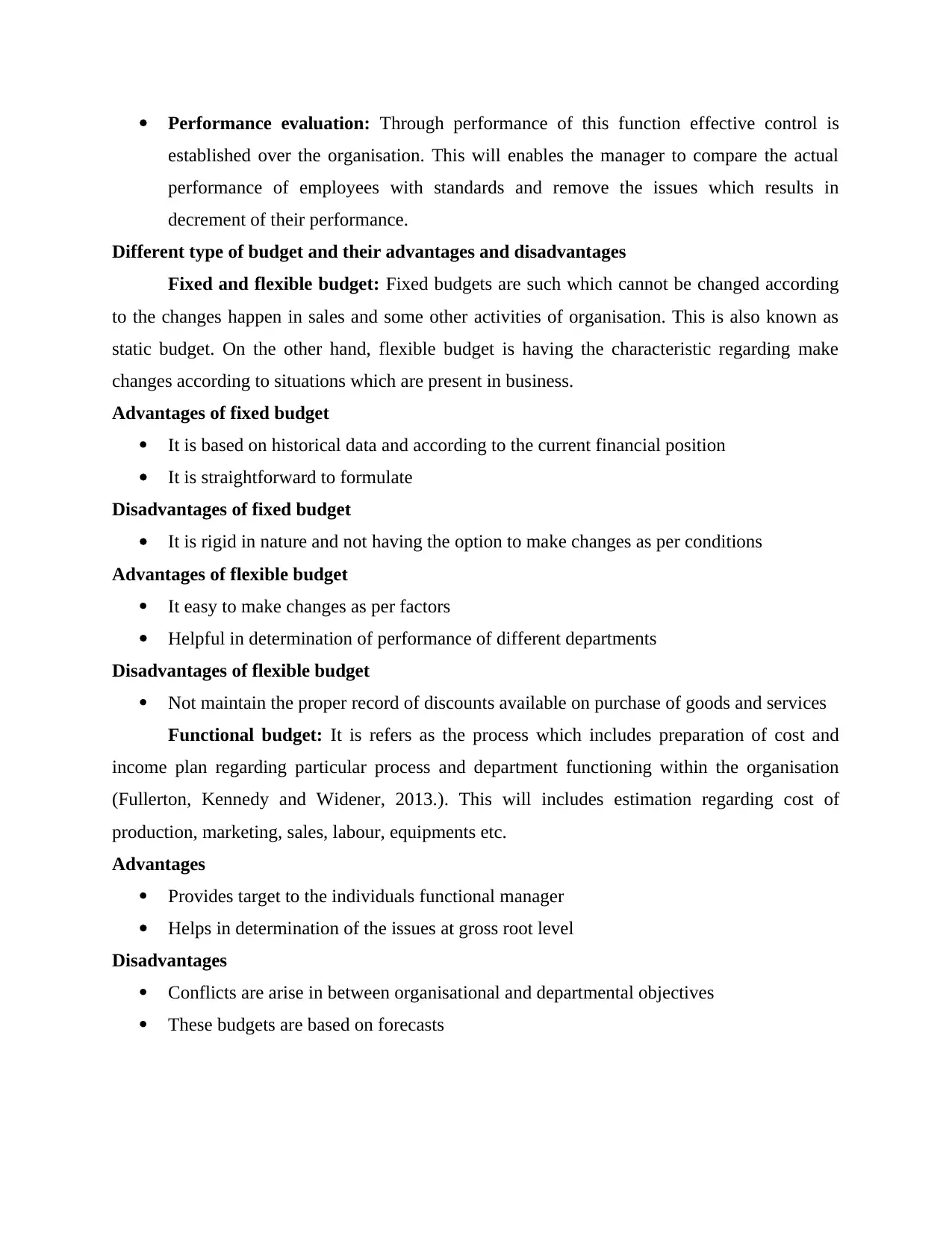
Performance evaluation: Through performance of this function effective control is
established over the organisation. This will enables the manager to compare the actual
performance of employees with standards and remove the issues which results in
decrement of their performance.
Different type of budget and their advantages and disadvantages
Fixed and flexible budget: Fixed budgets are such which cannot be changed according
to the changes happen in sales and some other activities of organisation. This is also known as
static budget. On the other hand, flexible budget is having the characteristic regarding make
changes according to situations which are present in business.
Advantages of fixed budget
It is based on historical data and according to the current financial position
It is straightforward to formulate
Disadvantages of fixed budget
It is rigid in nature and not having the option to make changes as per conditions
Advantages of flexible budget
It easy to make changes as per factors
Helpful in determination of performance of different departments
Disadvantages of flexible budget
Not maintain the proper record of discounts available on purchase of goods and services
Functional budget: It is refers as the process which includes preparation of cost and
income plan regarding particular process and department functioning within the organisation
(Fullerton, Kennedy and Widener, 2013.). This will includes estimation regarding cost of
production, marketing, sales, labour, equipments etc.
Advantages
Provides target to the individuals functional manager
Helps in determination of the issues at gross root level
Disadvantages
Conflicts are arise in between organisational and departmental objectives
These budgets are based on forecasts
established over the organisation. This will enables the manager to compare the actual
performance of employees with standards and remove the issues which results in
decrement of their performance.
Different type of budget and their advantages and disadvantages
Fixed and flexible budget: Fixed budgets are such which cannot be changed according
to the changes happen in sales and some other activities of organisation. This is also known as
static budget. On the other hand, flexible budget is having the characteristic regarding make
changes according to situations which are present in business.
Advantages of fixed budget
It is based on historical data and according to the current financial position
It is straightforward to formulate
Disadvantages of fixed budget
It is rigid in nature and not having the option to make changes as per conditions
Advantages of flexible budget
It easy to make changes as per factors
Helpful in determination of performance of different departments
Disadvantages of flexible budget
Not maintain the proper record of discounts available on purchase of goods and services
Functional budget: It is refers as the process which includes preparation of cost and
income plan regarding particular process and department functioning within the organisation
(Fullerton, Kennedy and Widener, 2013.). This will includes estimation regarding cost of
production, marketing, sales, labour, equipments etc.
Advantages
Provides target to the individuals functional manager
Helps in determination of the issues at gross root level
Disadvantages
Conflicts are arise in between organisational and departmental objectives
These budgets are based on forecasts
⊘ This is a preview!⊘
Do you want full access?
Subscribe today to unlock all pages.

Trusted by 1+ million students worldwide
1 out of 14
Related Documents
Your All-in-One AI-Powered Toolkit for Academic Success.
+13062052269
info@desklib.com
Available 24*7 on WhatsApp / Email
![[object Object]](/_next/static/media/star-bottom.7253800d.svg)
Unlock your academic potential
Copyright © 2020–2026 A2Z Services. All Rights Reserved. Developed and managed by ZUCOL.





